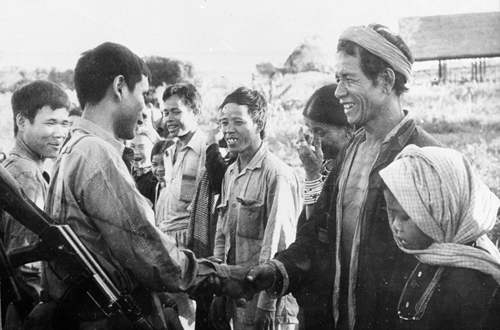Exercising right to self-defense while helping friends
According to historical documents, just right after winning the resistance war against the U.S. imperialists, in April, 1975, the Cambodian people continued to fall into a big tragedy caused by the Pol Pot gang’s brutal genocide policy. The proof was that in just three years, eight months, and 20 days, more than three million innocent Cambodians were killed by the Pol Pot regime.
Recalling the then “hung in a single hair” situation, in a historical documentary, titled “Marching Towards National Salvation,” Cambodian Prime Minister Hun Sen said that he and many Cambodians considered Vietnam the only country to help the Cambodians since it had stood side by side in fighting common invaders for national independence and freedom of each country.
    |
 |
|
People in Cambodia’s Ratanakiri welcoming Vietnamese volunteer soldiers and Cambodian armed forces in 1979 (File photo) |
Not only did the Pol Pot band push the Cambodian people to the brink of extinction, but also waged a bloody war, infringing on the sovereignty and territory of Vietnam in the Southwest. Not allowing the Fatherland’s border to be threatened and people to be brutally murdered by Pol Pot, the Vietnamese troops and people rose up to exercise their legitimate right to self-defense and launched a fierce counterattack, smashing Pol Pot's plot. In addition, responding to the urgent call of the Kampuchea United Front for National Salvation, the Vietnamese volunteer soldiers went to help the Cambodian to fight against Pol Pot gang with the spirit of “helping our friends means helping ourselves.”
The sacrifices of the Vietnamese volunteer soldiers and Cambodian troops and people paid off when on January 7, 1979, Phnom Penh Capital was liberated. As Prime Minister Hun Sen affirmed, the great victory on January 7, 1979 also marked the end of an unprecedented dark period in the history of Cambodia and opened up a new era in which the Cambodian people regained their freedom and had the opportunity to rebuild the country.
Right acknowledged
At the request of the Cambodian Revolutionary People's Council, ten years later, the Vietnamese volunteer soldiers continued to stay in Cambodia to help the Cambodian armed forces to hunt down the remnants of the Pol Pot regime, consolidate the revolutionary government, and recover the economy from the ruins left by the genocidal regime. Thanks to that, Cambodia's revolutionary armed forces became more mature and stronger, capable of defending the country. By the end of June, 1989, according to an agreement between the two sides, Vietnam withdrew all volunteer soldiers, fulfilling its international duties.
“We can ask a question that which country helped the Cambodian people, especially liberated the country from the genocidal Pol Pot regime and prevented their return? The answer is the Vietnamese people and military.” Prime Minister Hun Sen's words are the recognition of the sacrifices of the Vietnamese volunteer soldiers.
Nearly 40 years after the Pol Pot genocidal regime was overthrown, on November 16, 2018, former leaders of the Pol Pot regime were convicted of genocide by the Extraordinary Chambers in the Courts of Cambodia (ECCC). The court upheld two life sentences for the two most senior surviving members of the Khmer Rouge, Nuon Chea and Khieu Samphan. The conviction was the price that they had to pay for their crimes they committed against the Vietnamese and Cambodian people in the 1975-1979 period. Immediately after the ECCC's verdict was delivered, numerous press agencies and international experts said that the ruling affirmed Vietnam’s just deed of sending volunteer troops to help the Cambodian revolution.
More than four decades have passed, annually on January 7, the Vietnamese and Cambodian people hold activities to pay tribute to those who laid down their lives in the struggle against the genocidal Khmer Rouge regime. That is considered the motivation for the two countries to continue promoting the friendship and comprehensive cooperation on the basis of principles of peace and respect for each other's independence, sovereignty, and territorial integrity as well as for the legitimate interests of each other.
Until now, the victory is still recalled as a living proof of the spirit of solidarity and mutual assistance between the two neighbors of Vietnam and Cambodia in the most difficult moments.
Translated by Tran Hoai